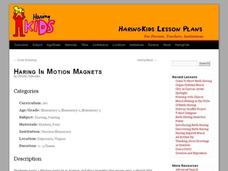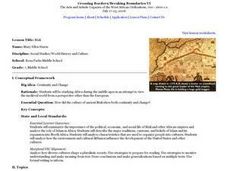Turabian Teacher Collaborative
Parts of Argument II: Article Critique
Break down the parts of argumentative writing with a critical thinking activity. High schoolers read an article of your (or their choice), and use a graphic organizer to delineate the ways the author structures his or her arguments.
Ohio Literacy Resource Center
Compare & Contrast Essay
Comparing two texts can build a greater understanding of the texts and themes of the works. Take some time to follow the steps here to guide your pupils through the process of composing compare-and-contrast essays.
Curated OER
Seed Swapping
Here is a fabulous, cross-curicular lesson on seeds. Elements of science, writing, math, agricultural practices, and art are all brought into this incredibly thorough plan. Additionally, a fun whole-class game is presented, and there is...
Channel Islands Film
Once Upon a Time (Sa Hi Pa Ca): Lesson Plan 3
What was the most significant tool used by the Chumash? How did the environment make the tool possible? What group behaviors allowed the Chumash be be successful for thousands of years? After watching West of the West's documentary Once...
Curated OER
I Am Special, You Are Special Too #2
After being read a story, the students attempt to identify one individual difference, and one thing about themselves that is similar to other students in the class and one thing that makes them special. For the art lesson plan, students...
Curated OER
Found Poetry with Primary Sources: The Great Depression
Pupils read a sample found poem and create one together as a class. In this Great Depression lesson, students select a topic, such as miners, and read primary source documents related to the topic. Pupils select one narrative as the...
Curated OER
Exploring Colors
Learners research visual arts by reading a children's book. In this colors lesson, students identify the primary colors and utilize food coloring, plastic cups and eye droppers to create art using the color combinations. Learners read...
Curated OER
Art From Map-Abstract composition using map and primary colors
The students use a map to create a Mondrian-like artwork. They put to use his severe simplicity in line as well as in color (of course, no green, which was a color he reportedly hated). Shapes created were more organic rather than...
Curated OER
The Role of the Museum
Young scholars identify the role of the museum as a cultural resource in the community. They use primary and secondary sources to evaluate institutional, and media influences on people and society in both historical and contemporary...
Curated OER
Haring In Motion Magnets
Students research visual arts by creating an art project for their homes. In this art analysis lesson, students identify the work of Keith Haring by researching the Internet and examining images. Students utilize tempera paints, poster...
Curated OER
A House Divided: Slavery in the United States
Students explore the history of the United States and slavery. In this slavery lesson plan, students view primary sources, complete journal writing, view videos, and answer short answer questions.
Curated OER
Slavery in America at the Time of the Civil War: Sources
Students discover how to use primary and secondary sources in research. In this Civil War lesson, students conduct research on slavery as they distinguish between primary and secondary sources regarding the same events.
Curated OER
Mali
Seventh graders begin the lesson by reading primary sources about the country of Mali. Using maps drawn in the past, they discuss what they can gather about the country from the map and how it has changed over time. They use a graphic...
Curated OER
Do We See What We Know?
Eighth graders compare two visual works of art about John Brown. They read a text or listen to an interview, and identify information about him. They debate their opinions using evidence in written and visual texts. They research other...
Curated OER
Introductory Activity for Color Unit: Edible Color Wheel
Students use food coloring and frosting to make an edible color wheel. They identify the primary colors and experiment with mixing colored frosting to produce the secondary colors. Students then eat their color wheel.
Curated OER
The Three Faces of William Penn
Students analyze art depicting William Penn. They analyze three different paintings discussing the symbolism, artistic elements, and depiction of Native Americans in each painting.
Curated OER
Dispute Over Slavery in Kansas Territory
Students analyze primary sources on slavery from Kansas Territory. In this Civil War lesson, students evaluate the antislavery and pro-slavery arguments and summarize key points. Students write a persuasive paper from the antislavery...
Curated OER
The Most American Thing in America: The Chautauqua
Students explore the Chautauqua movement. For this Pennsylvania history lesson, students use primary documents to explore what the Chautauqua was and how it made a difference in the American way of life.
Curated OER
The Declaration of Independence: From Rough Draft to Proclamation
Students examine and analyze an unknown document (Jefferson's original rough draught of The Declaration). In this document analysis lesson plan, students compare the rough draught with the first printed version and work in pairs to...
Curated OER
The Diary of Col. William Fairfax Gray
Fourth graders examine facts and opinions given by William Fairfax Gray in his diary, compare and contrast ideas expressed in his diary, express opinions using correct language arts skills, and calculate answers to given mathematical...
Curated OER
Fugitive Slaves and the Underground Railroad
Eleventh graders consider the impact of the Underground Railroad. In this slavery lesson, 11th graders examine primary documents as they conduct independent research to explore the role of the Underground Railroad during the fight for...
Curated OER
Experimenting with Colors
Students experiment with mixing primary colors together using frosting and pretzel sticks.
Curated OER
Tissue Paper Designs
Fifth graders explore the colors in the color wheel and complete a tissue art activity that includes a minimum of three different colors from the color wheel and two colors that are opposite each other on the color wheel. They discuss...
Other popular searches
- Art Lessons Primary
- Art Lessons Primary Penguins
- Edible Art Lessons Primary
- Art Lessons Primary Easter
- 3d Art Lessons Primary
- Art Lessons Primary Fruit
- Winter Art Lessons Primary
- Maori Art Lessons Primary
- Visual Art Lessons Primary
- Art Lessons Primary Tiger
- Art Lessons Primary Water
- Art Lessons Primary Victoria

























